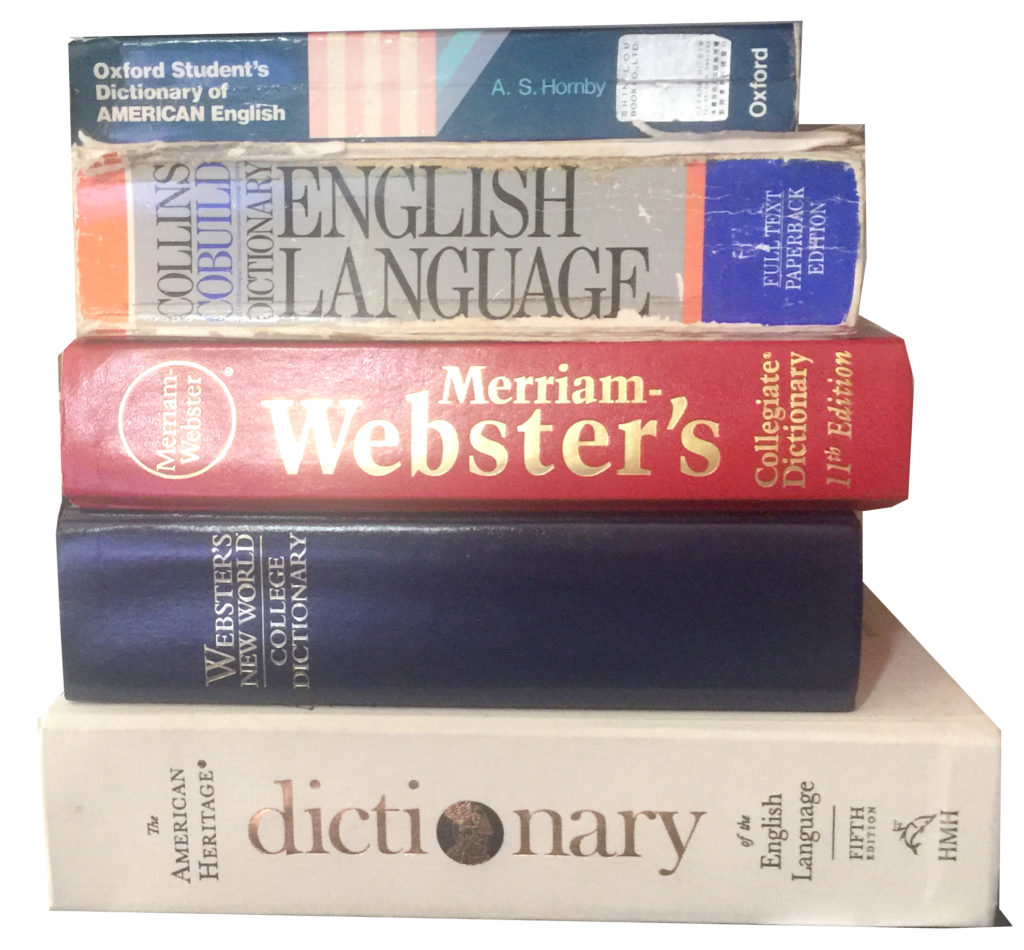One challenge to finding the right English slang dictionary is editors and publishers have different definitions of what slang is. Generally speaking, slang is informal English words and idioms, used mostly only in spoken English. Some authorities, however, define slang as language used by people of certain social classes or groups, often mainly within that group (e.g., young people, military, criminals). The collections of entries publishers put out can thus differ greatly.
(more…)Targets in English Blog
Better Know Your Dictionaries, Part 4: Sizing Up Phrasal Verb Dictionaries

Take is a common verb in English: few people ever have to look it up. But check out the many verbs we put together by adding on a word: take in, take out, take on, take off, take up, take down, take over, take under, take back, take aback, take along, take to, take away … These are phrasal verbs and the takeaway is they mix people up a lot.
Also phrasal verbs: look up, check out, put together, add on, and mix up. Adding complexity, many nouns come from phrasal verbs, for example takeaway.
Elements of Phrasal Verbs
Phrasal verbs are idiomatic expressions with their own special grammatical considerations. They consist of a verb and a particle—a preposition or an adverb that gives them new meanings. (Keep in mind, often the particle looks like a preposition but functions as an adverb, which can lead to confusion when capitalizing titles. Note the phrasal verb size up in the title above; up is capped because it’s an adverb, not a preposition.)
(more…)Better Know Your Dictionaries, Part 3: Idiom Dictionaries for Pain-in-the-Neck Vocabulary
So you have the dictionaries you need for spelling and definitions, but what happens when you come across a phrase like off the beaten path and wonder, “Is it path or track?” And while we’re on that track, is a person said to be from the wrong side of the track or the wrong side of the tracks? Here you need an idiom dictionary.

Thorns in Your Side
Idioms are phrases whose meanings are not clear from the words they are made up of. And they are not just scattered clichés. A solid idiom dictionary may have 10,000 or more entries including figures of speech, common similes, and phrasal verbs. A quick scan will show that most are, in fact, really common, in both formal and informal uses.
If this sounds like a pain in the neck, imagine being a non-native speaker and wondering why something that’s bothersome causes neck pain.
Better Know Your Dictionaries, Part 2: Religion, Politics, and Style

Noah Webster founded a dictionary tradition for American English, giving the country an American standard as opposed to the King’s English, in both word usage and spelling—his blue-backed speller books taught kids spelling for five generations. The Webster brand has long given authority to spelling decisions, even in dictionaries that often disagree with one another. So where are we now on spelling?
Better Know Your Dictionaries, Part 1: How Webster Became a Household Name

If you’re working with the English language, as a writer, an editor, or a teacher, dictionaries are of course basic tools of the trade. It’s essential, therefore, to define them in terms of advantages and uses. This is part 1 of a series.
Noah Webster
History classes might not spend a lot of time on Noah Webster, but Webster’s contributions to the country in the earliest days were substantial.
Born in 1758, Webster grew up alongside a nation also just coming into its own. After studying at Yale University, he went on to become known as a lexicographer, textbook pioneer, spelling reformer, author, and editor, not to mention lawyer, political writer, member of the Connecticut House of Representatives, and founder of the Connecticut Society for the Abolition of Slavery.
(more…)